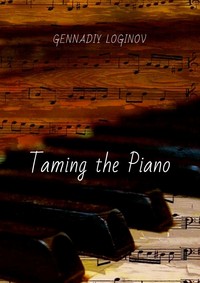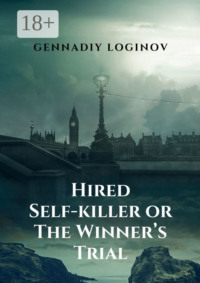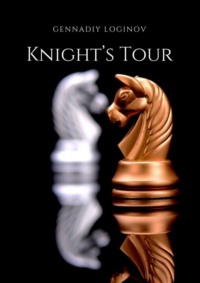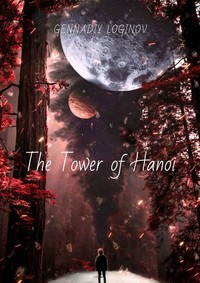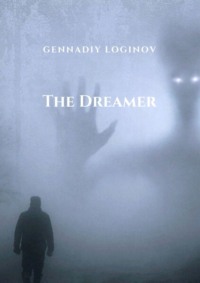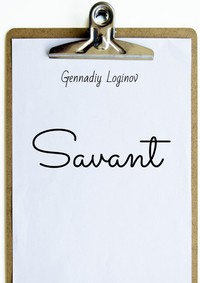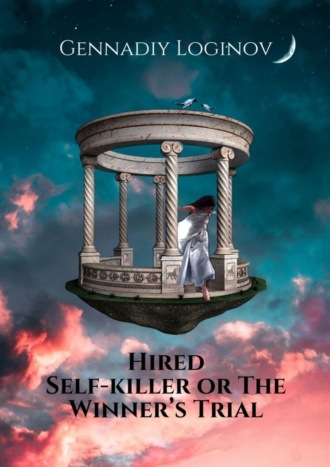
Полная версия
Hired Self-killer or The Winner’s Trial
Making his way through the jungle of multi-coloured squares, files and ranks, he no longer had in himself a hundredth of the former excitement since he had experienced too much. He was tired – not only physically but also mentally. And the White Knight’s thoughts kept returning to his native side and his countrymen. Some of them were captured en passant, some participated in the castling, some walked stubbornly to the edge. Well, fate had scattered chessmen across the board.
He tried to entertain himself with thoughts about how he would return and tell everyone what he had seen during his difficult, long and dangerous journey: about the green nightingale’s wondrous singing, about the arrogant and rude Salt Cellar, about an interesting and worthy opponent he had met in the face of the Black Knight and about the unpleasant metamorphosis that had happened with the once honest and bold White Man. He imagined how he would introduce Dog to everyone and retire, starting to write memoirs based on his travel notes, where he would tell future generations about the structure of the universe, transferring to them the invaluable experience of his trip around the board…
A familiar buzz interrupted the White Knights’ path again. Having circled above, the nightingale landed before him on the board and froze, rubbing its front feet, as if it was expecting something.
“And you are all the same – vile, disgusting and smelly. I don’t know who you are or what you are, but now it seems to me, nightingales don’t smell like that, don’t sing and don’t fly like that,” the traveller said grimly. He had noticeably matured, become stronger and wiser after his tiresome wanderings through chess rivers and lakes, chess seas, mountains and jungles, chess deserts, cities and villages. He wasn’t the same young and naïve romantic as he had been at the very beginning of the journey, many moves ago. Perhaps he lost not only sentimentality but also his enthusiasm. But at the same time, unnecessary thoughts and unreasonable unrest had decreased. Maybe another piece in his place would have committed suicide long ago, jumping from the edge of the board into the unknown, but the White Knight wasn’t this kind of chessman. He was used to seeing everything through till the end, – of course, if he was sure this made any sense, and nothing objectively deprived him of such an opportunity.
Actually, he wanted to go home more than anything else: no honours, no awards, no titles, he just wished to gallop against the wind, inhale the air of freedom, and graze grass in his native dark square “g1.” But that was still ahead: he left behind most of the path, but the tour itself wasn’t completed yet.
A sharp clap brought the White Knight out of stupor. In the blink of an eye, something huge descended from heaven and fell upon the “green nightingale” (whatever this creature truly was), leaving some kind of flattened vile substance in its place.
Peering at the remains of the so-called nightingale, in which false sweet voice he had naively believed once, the White Knight sighed and put his hat over his eyes. The royal gift had now become worn, but it was the last thing that remained dear to him. With the death of the pale-winged creature, he felt as if a part of himself had also perished – maybe it wasn’t his best part, but its loss still left a void inside.
Looking up, from where a punishing blow had fallen upon his former idol, the White Knight reflected about his place in the world for a long time. It wasn’t about the current move or a particular square on a chessboard, but his place in general. The matches he had survived, the pieces he had won, the announced checks – at this moment, everything seemed so insignificant and vain, lacking any positive meaning…
And at the same time, he had only just begun to understand that the sense of life truly existed: the roots of this meaning lied far beyond the limits of the playing board, but it was the place where the answers to all questions were. He meant eternal questions as to how and from where the board appeared, where did the pieces come from, and also – what was the origin of files and ranks, squares and game rules? At the same time, the White Knight was more interested in “why” and “for what purpose” questions than in answers to “how” and “where”.
Of course, he was neither the first nor the last one to whom such thoughts came to mind. Some thinkers studied the composition of pieces’ bodies and correlated it with the composition of the board material. They assumed that chessmen had originated naturally from the board, and the squares were nothing more than the result of the pieces’ activities, as well as gradually formed rules of the game. Others claimed that the pieces had been created before the board. Third ones believed that they had been brought here from the outside, from another board.
Philosophers argued about what had appeared earlier – the game or the rules; researchers traced the physiological path of modern Queens from the faded ancient pawns discovered during archaeological excavations under the playing board. But all these theories were distant from life; they were certainly interesting but distracted from the essence. In reality, there was no difference for the White Knight whether chessmen came from ancient pawns, generated in time immemorial in the depths of the board itself, whether someone made them and placed on the board, or whether they were brought from any other board. Besides, the last version didn’t answer the question about the origin of pieces but raised the question of how they had appeared on that another board. And all these were particulars, which didn’t give the White Knight an answer to the question of who stayed behind the moves and crushed the “green nightingale,” but he passionately wanted to find the solution that could give him the key to understanding everything else.
Meanwhile, the path didn’t wait, and, deciding to return to his reasoning at a different time and in a more comfortable environment, the White Knight continued the interrupted journey. Faithful Dog followed him.
“Hey, you!”
The White Knight stopped.
“Look who’s that – a horse in the hat! Hey, the Horse, I’m talking to you! You’re not local, ah? Where are you from?”
The cheeky voice didn’t bode well. The clouds were gathering above. The mocking Black Pawn, miserable, but confident in his power and impunity, emerged from the darkness, accompanied by his chess gang. Perhaps these villains didn’t even know who they were messing with, since the White Knight had made multiple devastating raids on the enemy’s camp in the recent past. Destroying strategic reserves and undermining the fighting efficiency of the enemy’s army, he had won a lot of Black Pawns like this one. Some of them had died with dignity, others had stained their name with shame, but in any case, in the clash with the White Knight, they couldn’t be saved by fleeing or superiority in numbers.
“Are you talking to me?” the tired wanderer asked, stretching slowly before the upcoming fight.
“With you, sure. Think faster, Nelly!” one of the Black Pawns answered spitefully.
Their rudeness, vulgarity and self-assurance began to enrage and annoy him.
“You are lucky that a temporary truce had been declared between us. Therefore, I give you one last chance to move away from here and hinder me no further,” the White Knight said with quiet menace. The answer was laughter. Suddenly, the Black Knight jumped over the squad of maliciously grinning opponents. He hadn’t changed after their last meeting, although many moves had passed since then.
“Well, here we are again. The time goes on,” the Black Knight said as if delaying something he didn’t want but had to do by virtue of duty. “And you are still travelling alone. They could escort you after all. Of course, it will be too noticeable for the scout and will slow you down, but at least it would be much safer for you than going by yourself. Or with your ridiculous sugar lump.”
“His name is Dog,” the White Knight hastily corrected.
“It doesn’t matter,” his interlocutor dismissed the remark. “Perhaps, in that case, I could somehow play a failure or convince the command that I wasn’t sure about the outcome of the action. But now – I’m sorry, you have complicated everything for yourself. You could travel safely, and your guards would loom somewhere on the horizon. But I understand; the White King has lost many defenders recently. And also – he has developed paranoia. The burden of power, you know…”
“So you’ve decided to forget about all the agreements, get rid of me, and prevent me from bringing almost complete information to the headquarters. I guess you want to pocket the data and transfer it to the Black King,” the White Knight stated.
“Hey, please, don’t dramatize. It’s our job. We both fulfil our duty. We cannot act as fellows. It just happened,” the enemy admitted in a tone that was seemingly full of genuine regret. “Don’t you worry – we will honour you as a hero.”
“I don’t worry at all. Because you won’t have such an opportunity,” the White Knight answered. He understood that the Black Knight and the Black Pawns were covering each other, while he stood in front of them openly, without any protection from other pieces. The knight-horse had to make some move – for example, retreat to one of the previous squares, thereby failing his task, but his self-esteem didn’t allow him to do so. He could win the Black Knight, and that would mean an equivalent exchange and would be formally reasonable from the position of the general strategic plan. However, his life was behind this “equivalent exchange”, not to mention the fact that the task would also be failed. And in this case, the intelligence information which he had compiled with hard work would get into the enemy’s hands. Moreover, the Blacks would present the situation as if the Whites were violators of the truce.
In other words, his hoofs were shackled by a whole mass of obligations, laws, rules and restrictions; he didn’t have the right to commit reckless actions under the influence of momentary impulses. He thought that maybe the White King had a hard time too, deciding to bring this or that piece under attack, and sacrificing them for the sake of a more advantageous strategic position.
But at the moment, everyone forgot about the sugar named Dog, who wasn’t bound with all these rules and obligations. Sensing the danger for his master, he rushed headlong through the squares that separated him from a handful of enemies, and, bumping with force to the very centre, scattered the lifeless pieces across the chessboard. He slid along an uneven path, so he fell from the board edge and disappeared, hitting at something in the darkness.
Being in an indescribable confusion from shock and grief, the White Knight couldn’t find thoughts for a long time to describe everything that was happening in his soul at the moment. He became hysterical. He had a fever. His heart galloped like some horse on the field: hop hop, hop hop, clack-clack, hop hop…
But there was still no time for grief and self-torture. It was quite possible that the first wave of attackers could be followed by a second, control wave which had to confirm the success of the task and report to the Black King’s headquarters quickly. If the White Knight remained in his stupor now, he would miss the precious time won by his faithful friend, and the sacrifice of poor Dog would be useless.
He must go forward. Only forward. Don’t stop. One more step. A little more. He has almost reached…
Almost… Reached…
Treading his hooves heavily on the ground of a desiccated desert full of once-varnished, but now cracked squares, the White Knight stumbled and was close to collapse and losing consciousness, falling asleep forever among the intersection of files and ranks dappling before his eyes. But his will, faith and duty forced him to summon his strength and go on, on, on…
Well, not only that. The knight-horse also had to find the answer to the main question. And he had to return to his native dark square “g1”, where he could lie down on cool grass and rest. He must do the first thing, but he also wanted it; the second desire had nothing to do with duties and obligations – he simply wanted it.
From afar, he saw the gathered crowd of White pieces chanting his name, and smiled weakly, realizing that his gruelling and dangerous tour was close to its long-awaited completion. What did he feel at the moment? Probably, first of all – fatigue, severe, all-consuming fatigue, in which everything else was drowned, leaving only a barely visible island of joy, where the tree of faith blossomed, rising above the waves.
“Happy New Move! Cheers!” exclaimed the Whites, celebrating his sixty-third move with champagne shots. The great traveller who made around the board journey henceforth became a very important figure, figuratively speaking. Moreover, for the time of his adventure, the age of the White King began to influence him more and more, and now the venerable monarch was planning to retire and transfer the reins of power to the young, energetic hero who enjoyed the love of everyone.
In his mind, the White Knight appreciated the trust highly, but at the moment, he was too weak and exhausted to appreciate it with his heart. The pieces gathered around him and asked in bewilderment why he sidestepped the decision, convincing that it was enough for him participating in hard everyday battles, and secret raids into the enemy encampment: having occupied such an honourable post, he would become an untouchable piece and even the real thugs from enemy ranks wouldn’t dare to kill him because his fame spread throughout all the squares of the chessboard.
Truly, the universal respect was so high that even the Black King’s representatives came to honour him: it was a politically competent move, since, on the one hand, they could deny all possible accusations (if they would be brought) by presenting counterclaims; and if everything would go peacefully and without pretensions, – they could feast with everyone, maintaining the semblance of a truce, and then inform their monarch of the result.
Of course, the White Knight would have a lot of honourable duties that were incompatible with all his races, jumps and tricks. He became a respectable and important person, and from now on, he would supposedly step exactly one vacant square in any direction, leaning on a cane. Sometimes he would remember how fun it was galloping on the two-colour field, and it would be so from move to move, to his old age. But he didn’t want this.
After thanking cordially those present and, first of all, His White Majesty, the White Knight immediately excused himself and, stating that he had been tired of wars and the burden of service, asked to resign. Of course, he could call on both the Whites and the Blacks to create a united empire, stopping endless and meaningless conflicts, begin to solve urgent and topical chess problems jointly, and even expected that many would formally support such a proposal. But like no one else, he understood that peace wouldn’t actually happen. He also understood that, despite all the wars and troubles (as vain as everything else was), there was the Truth lying outside the board, and only this Truth had an objective meaning. As for wars… Wars continued because behind each of them stood free will and choice of great many pieces directly involved in them. He had been one of them once. Now – he would wait for the day when someone’s hand would carry him from the board to where he might see his dear Dog again and where the Black Knight would meet him not as an enemy, but as a friend.
In the end, he asked the White King and the authorized representatives of the Black King to provide him with a small plot of land for personal possession, excluding him from the both Kingdoms’ zone of interests. Naturally, all this was unsteady, temporary, ephemeral, like everything else in this unstable world, where vows were violated, friends betrayed each other and laws existed only to be broken. But still, he could buy himself at least some time to live for himself now, when he felt he owed nothing to anyone and wasn’t obliged to do anything. Well, maybe he owed something to the one who led him all the time, standing in the shadows behind the board.
Of course, many pieces didn’t want to let him go. And it wasn’t all about universal love. He simply knew too much and, without control, could be as potentially dangerous as before he had been potentially useful. In any case, those in power explained that such matters couldn’t be resolved overnight and chose four squares in the centre of the board, which for many years had been considered most valuable but disputed territories and passed from hand to hand. From now on, they were declared the possession of the White Knight. That would supposedly become a sign of love and friendship between two nations – as soon as all appropriate legal formalities and delays would be settled.
Another great traveller’s request was even stranger – he asked to take the orphaned Pawn of his fellow, the Black Knight (who, as he became aware, had died under mysterious circumstances) into state care, allowing her to learn and prepare for the promotion. This time, he caused real confusion in the minds of many, although the act served to some extent in strengthening friendly relations between long-warring nations, at least, temporarily. And it was natural – at all times, there were not only those who needed war more than air, but also pieces who were tired of endless battles and ready to fraternize with former enemies.
The White King didn’t want to give one secret order, which he, in his deep conviction, was forced to provide, based on prevailing political realities. For a long time, he recalled numerous merits of the great White Knight (without any exaggeration). And, above all, he remembered how the White Knight had saved His Majesty’s life, and later had made his famous journey. But this eccentric supporter, whose motivation had always remained a mystery to the King – who could have guessed he would make such a strange decision that created a lot of unnecessary problems?
The White King prophesied him as his successor and could finally retire and have a well-deserved rest, leaving power in the hands of the illustrious hero. And now – let him blame himself…
In sad thoughtfulness, the White King sat at a table with a tactical map of the battlefield which was, in fact, a small version of the chessboard with smaller pieces placed on it. He called the silent and formidable White Rook and fulfilled his royal duty with deep reluctance, giving him extremely short and clear orders regarding the fate of the White Knight.
It was still necessary to wait until all the excitement subsided, and then it became possible to eliminate the potential threat quietly and accurately, presenting the whole thing so that the suspicion would fall on the Enemy. And this was called “politics”.
The White Knight didn’t have a shadow of a doubt – it would be so. But he was just tired of everything and everyone. And now, breathing the native air on the “g1” square, the knight-horse felt that he knew the real price of happiness. He bit a spikelet, laid down in the middle of a dark field and, finally, dozed off. And then someone’s hand, imperceptibly for others, took him from this board and replaced him to another. Here, his white sugar named Dog was waiting for him, wandering around with the Black Knight, who actually was no longer Black or White. There were no wars, there was no anger, and there were no vile stabs in the back. But the real nightingale sang with a marvellous voice, in the air filled with the aromas of blooming spring, and there were answers to all questions here.
Man with Horns
Waking up one morning, Baron D`Fect discovered horns on his head: they were wide and branched, and weighed him so much that clearly prevented him from getting out of bed. Not to mention other troubles as torn pillows and sheets, a broken headboard and a tattered tapestry on a scratched wall.
Any attempt to move was faced with a mass of obvious inconveniences that significantly limited the mobility of Monsieur Baron.
“Mon Dieu!” the unfortunate man snivelled, grimacing anxiously and resentfully. He touched the base of the horns and began to shake in a silent hysteria; tears dripped down his cheeks. Since such matters had never interested him, Monsieur Baron didn’t possess in-depth knowledge of horns and their varieties. But, to the best of his moderate understanding, he was aware that usually horns are specific projections related to skin, just like hair or nails, although in some cases extensions of a skull are presented by layers of bone substance, and then they are called antlers. For example, deer antlers are very sensitive, because they contain nerves and blood vessels. And, if memory served him right, there were also horns with a bone core inside, covered with a thick layer of keratinized skin.
“Well, it seems it happens: then you visit a salon and now you are a mouflon,” D’Fect said with melancholy longing in his voice, despite the fact that his horns looked more like deer antlers than mutton horns. However, at the moment, Monsieur Baron didn’t care about nuances. Still not fully recovering from the sudden trouble which promised to transform in serious headache (speaking both literally and figuratively), he soon regained his former clarity of mind and started to build an action plan for the nearest future.
Obviously, if he had never managed to get out of bed on his own, he would have been forced to call the servants. But at the same time, he would rather agree to beheading than appearing before someone – provided that the executioner would cut the head off without looking. On the other hand – even if Baron rose from his bed by himself, he would still have to meet the servants sooner or later, so it was foolish to delay the inevitable. Baron realized the fact, and yet he decided to treat his own weakness with respect, allowing himself to take time.
Of course, he could lock himself in the room, forbid anyone to go inside and order the servants to leave food trays at the door. But anyway, everyone would inevitably have questions: you might have some quirks, but that would be extremely strange. If he declared that he was unwell (and this would be fully consistent with the truth, considering circumstances), the servants would immediately call the doctor, informing all his friends, relatives, heirs, acquaintances, business partners, the entire local elite, his secretary and God knows who else. He could refuse to let someone inside, but in any case, at some point, his worried friends and relatives would order the servants to break the door, presenting the baron to the world in all the horror of his shame.
However, even if the baron convinced everyone to leave him alone, and remained forever in his sleeping quarters, picking up food trays only after the servants left, could he call this existence a normal life? Of course, a considerable number of criminals are sitting in disgusting casemates and prisons, hospitals are crowded with people dying from terrible and painful diseases, the bodies of heroes turn into bloodied meat on the battlefields, and, presumably, these men experience far more inconvenience and suffering. Perhaps they would have agreed to swap places with the baron without hesitation, if they had such an opportunity. Still, this fact didn’t comfort him.
Naturally, he was neither a hero, or a genius, or a particularly zealous Catholic, or a particularly ardent philanthropist, he was not distinguished by a brilliant mind or outstanding skills and talents. But at the same time, he wasn’t some kind of rascal or scoundrel, and in these days the fact spoke for itself. He also wasn’t a simpleton or a shallow man without any virtues and his own opinion. Therefore, the prospect of spending the rest of his days locked up in this room for such completely absurd and insulting reason didn’t attract him at all.



